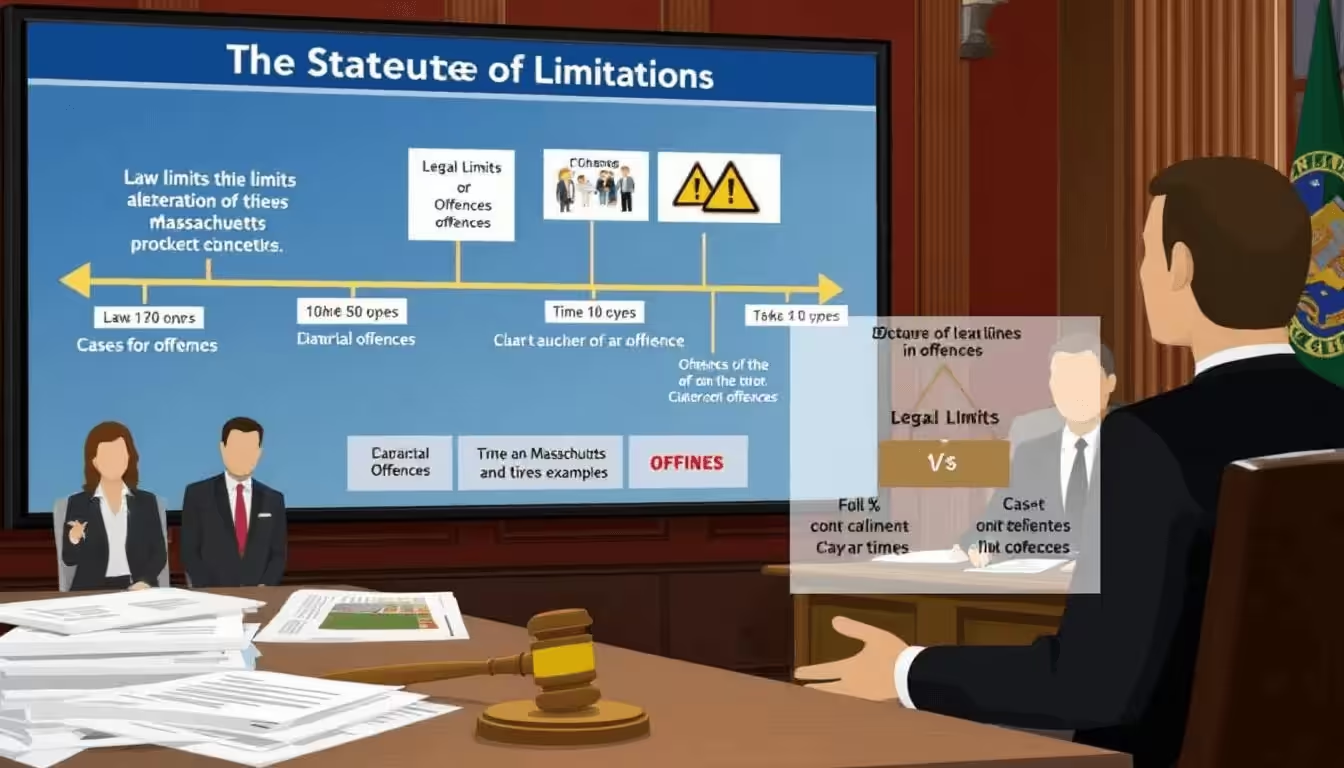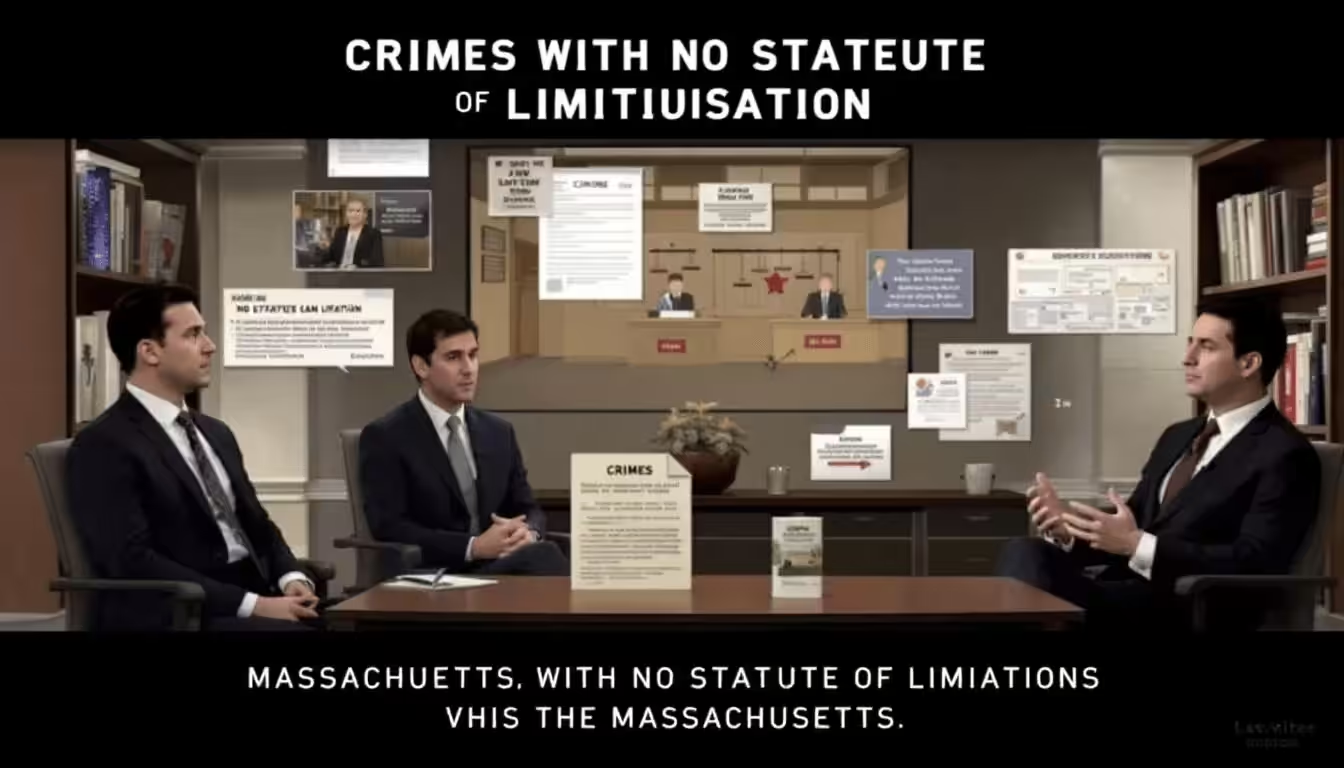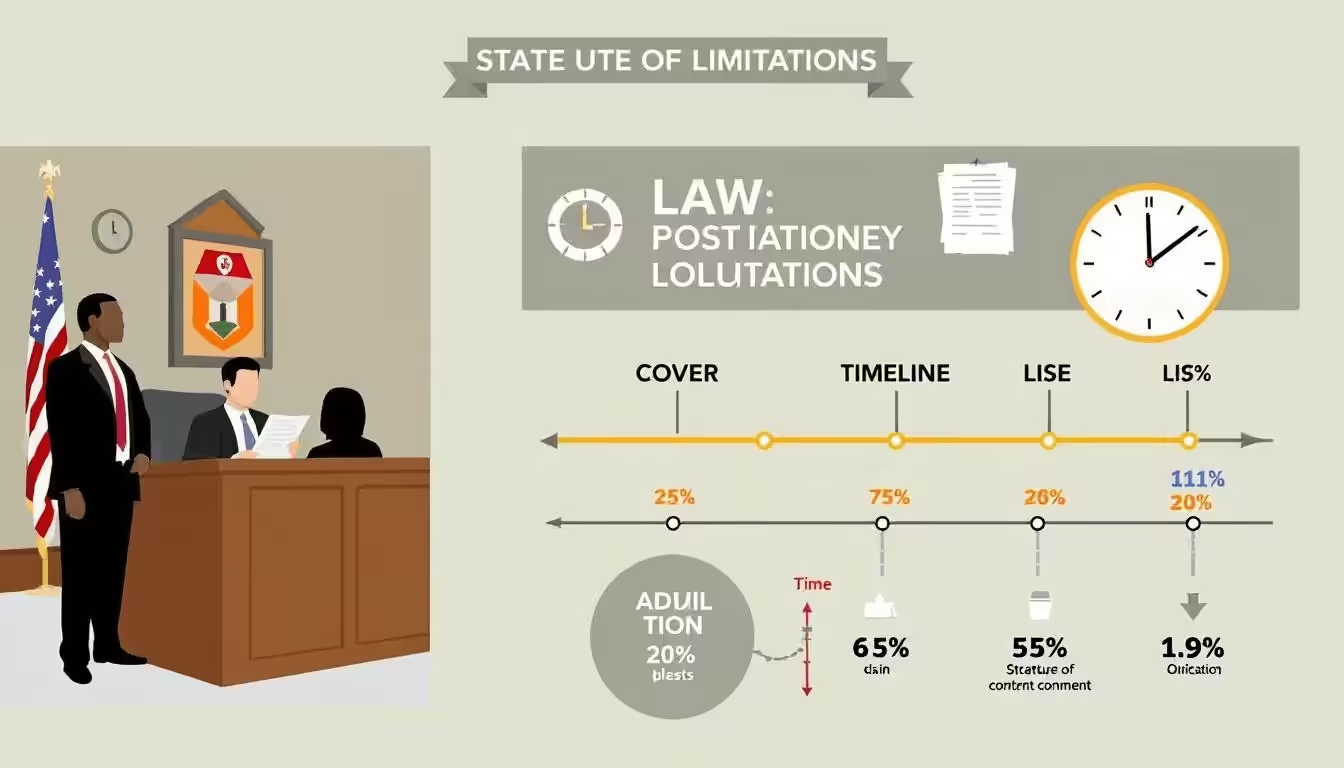
What is the Statute of Limitations in Massachusetts❓
Need to file a lawsuit in Massachusetts? Understanding the Statute of Limitations in Massachusetts is key. These laws set deadlines for different types of legal actions. This article breaks down the specific time limits for civil and criminal cases, helping you navigate your legal rights.
Key Takeaways
- ➡️ Statutes of limitations in Massachusetts establish strict timeframes for filing civil and criminal cases, emphasizing the importance of initiating legal actions within these limits to ensure evidence integrity and witness availability.
- ➡️ The statute of limitations for most civil claims, including personal injury and property damage, is generally three years, while felonies may have up to six years for prosecution, highlighting the need for timely legal action.
- ➡️ Certain serious crimes, including murder and child-related offenses, have no statute of limitations in Massachusetts, allowing for prosecution regardless of the time passed, which ensures justice for severe offenses.
Definition and Importance of Statute of Limitations
Statutes of limitations are laws that establish maximum timeframes for initiating legal actions. Individuals must adhere to these timeframes to file their cases. These time limits are crucial because they ensure that legal claims are made while evidence is still fresh and witnesses are available. In Massachusetts, these statutes represent critical timelines that determine the viability of court actions.
Knowing these time limits is crucial for anyone facing a legal issue. If the statute of limitations expires, the case cannot move forward, preventing the aggrieved party from seeking justice.
These laws provide a structured and fair approach to legal proceedings in civil matters, ensuring timely justice and protecting individuals from indefinite legal uncertainty.
Purpose Behind These Legal Time Limits
The primary purpose of setting time limits for filing claims is to preserve the integrity of evidence and support fair legal trials. When claims are brought within a reasonable time limit set, it ensures that witness memories are still fresh, physical evidence is intact, and the overall reliability of the legal process is maintained, despite the limitations set.
These statutes also provide closure and certainty for all parties. Knowing the time frame for filing a legal claim encourages timely justice and reduces the stress of indefinite legal battles. This legal framework balances the interests of plaintiffs and defendants, ensuring a fair and just legal system.
General Overview of Massachusetts Statute of Limitations

Massachusetts law sets specific time limits for filing both civil and criminal cases, reflecting the diverse nature of legal matters. These statutes of limitations differ significantly between civil and criminal cases, highlighting the importance of understanding the specific deadlines for your particular legal issue. Comprehensive details on these time frames can be found in Massachusetts General Laws Chapter 260.
The aim of highlighting these statutes is to emphasize their importance and variety across legal issues. Whether it’s personal injury cases, property damage claims, or criminal offenses, knowing the statute of limitations is key to protecting your legal rights.
Civil Cases
In Massachusetts, the general time frame for initiating most civil cases is three years. This includes:
- ▶️ Personal injury claims, which must be filed within three years of the incident.
- ▶️ Property damage claims, also requiring filing within three years of the incident.
- ▶️ Wrongful death cases, falling under the three-year statute of limitations.
- ▶️ Product liability claims, which must be filed within three years as well.
Fraud-related claims must be filed within three years as well. If a civil lawsuit is filed after the statute of limitations has expired, the lawsuit will be dismissed. Thus, immediate legal action is vital, especially in personal injury and domestic violence claims, where timely justice can greatly influence the outcome.
Criminal Cases
The statute of limitations for criminal charges in Massachusetts varies between felonies and misdemeanors. For felonies, the typical statute of limitations is six years, allowing a more extended period for prosecution. This longer time frame reflects the serious nature of felony offenses and the need for thorough investigations.
Misdemeanors, on the other hand, have shorter statutes of limitations. This distinction underscores the importance of timely prosecution in criminal cases. Both defendants and prosecutors need to be aware of these time limits to ensure that justice is served within Massachusetts law.
Specific Statutes of Limitations by Case Type
The statute of limitations in Massachusetts varies significantly based on the type of case, covering both civil and criminal matters. Certain civil claims, such as those related to fraud or medical malpractice, have specific limitation periods that must be adhered to. Consulting a knowledgeable attorney can offer vital insights about the statute of limitations affecting your case.
This section will delve into the specific statutes of limitations for different case types, including personal injury, medical malpractice, breach of contract, property damage, and workers’ compensation claims. Each subsection will offer detailed information to help you understand the unique time limits for these various legal matters.
Personal Injury Cases
In Massachusetts, the statute of limitations for filing a personal injury claim is generally three years. This includes claims arising from car accidents, hit and run incidents, and other personal injuries. For wrongful death cases, the filing period is three years from the date of death.
Dog bite injury lawsuits must also be filed within three years once the injury is recognized. Knowing these time limits is essential to preserve your right to file a personal injury claim and seek justice for your injuries.
Medical Malpractice Cases
The statute of limitations for medical malpractice cases in Massachusetts is three years after the discovery of the injury, with a seven-year absolute limit. This means that even if the injury is discovered later, the claim must be filed within seven years of the incident.
For incidents occurring before a child’s sixth birthday, lawsuits must be filed before the child’s ninth birthday. In cases of medical malpractice that occurred during birth, lawsuits must be filed by the child’s seventh birthday. These specific rules emphasize the need to understand the unique time limits for medical malpractice claims.
Breach of Contract
In Massachusetts, the statute of limitations for breaches of written contracts is six years. This period begins when the contract is breached, not when the breach is discovered. The statute of limitations for contract disputes is strictly enforced, making it essential to act promptly.
For oral contracts, the filing period can vary, but it is generally shorter than for written contracts. Knowing when the breach occurred and being aware of the time limits are crucial for protecting your legal rights in contract disputes.
Property Damage Claims
Property damage claims in Massachusetts must be filed within three years of the incident causing the damage. This specific time limit ensures that claims are made while evidence and details of the damage are still fresh.
Filing property damage claims promptly is essential to securing compensation for the losses incurred.
Workers’ Compensation Claims
In Massachusetts, workers have a four-year period to file workers’ compensation claims after recognizing their injury. This time limit emphasizes the importance of being aware of your rights and the timing associated with filing these claims.
Workers’ compensation claims are essential for providing financial assistance to employees injured on the job. The vital role of timely filing is crucial for securing the benefits and support needed during recovery.
Crimes with No Statute of Limitations

In Massachusetts, certain serious crimes can be prosecuted at any time, without a statute of limitations. This includes heinous offenses such as murder and certain sexual assault cases. The rationale behind this exemption is to serve justice due to the severity of the offense.
Crimes involving minors, including rape and human trafficking, are also exempt from any statute of limitations in Massachusetts. Knowing which crimes are exempt highlights the legal system’s commitment to addressing serious injustices and providing opportunities for legal redress.
Violent Crimes
Murder is one of the key violent crimes in Massachusetts that can be prosecuted at any time, as it has no statute of limitations. This allows legal action to be taken regardless of how much time has passed since the offense occurred.
Certain other violent crimes are classified as serious offenses that also have no statute of limitations, which is a serious matter. This legal provision ensures that perpetrators of such crimes can be brought to justice, no matter how long ago the crime was committed.
Crimes Against Minors
In Massachusetts, certain crimes involving minors are exempt from the statute of limitations, allowing prosecution at any time. This includes sexual assault against minors, where legal action can be taken regardless of when the crime occurred if the victim was under 16 at the time of the offense.
Other crimes involving children, such as sex trafficking and certain forms of kidnapping, are also prosecuted without a statute of limitations. This exemption guarantees accountability and justice for the victims of these serious offenses.
Tolling and Exceptions to the Statute of Limitations

Certain events can suspend, or “toll,” the statute of limitations in Massachusetts. For example, if the defendant is absent from the state, the clock may pause on the limitation period. This ensures fairness by allowing plaintiffs to file a claim when the defendant is present.
Other circumstances that can toll the statute include the claimant being a minor, mentally incapacitated, or incarcerated. These conditions can extend the time allowed to file a lawsuit beyond the standard limitation period, providing necessary flexibility in the legal process.
Discovery Rule
The discovery rule allows the limitation period to begin only when the injured party becomes aware of the injury. In Massachusetts, this rule is particularly relevant in medical malpractice cases, where the injury might not be immediately apparent.
The discovery rule means that the statute of limitations starts when the plaintiff discovers or should have discovered the injury, rather than when it occurred. This provision guarantees individuals a fair opportunity to seek justice once they become aware of the harm done to them.
Other Tolling Circumstances
Other special rules can also pause the running of the statute of limitations. For instance, if the defendant is not present in Massachusetts, the statute can be tolled until they return. This ensures that plaintiffs are not disadvantaged by the defendant’s absence.
These tolling circumstances ensure that the statutes of limitations are applied fairly, allowing for exceptions in certain conditions to provide justice in many cases.
Seeking Legal Advice

Understanding the Massachusetts statute of limitations is vital for seeking justice within legal deadlines. Consulting a legal professional can offer appropriate advice and help navigate the complexities of these statutes.
Victims of domestic violence, for example, should seek legal advice promptly to protect their rights regarding time limits for their claims. If unsure about the time limits for filing a claim, contacting a Boston personal injury lawyer as soon as possible is advisable for each person involved.
Importance of Timely Action
Knowing the statute of limitations empowers individuals to take timely action for fair legal proceedings. Contacting a lawyer well before the statute expires is essential to avoid the risk of encountering legal issues.
Hesitation to act regarding the statute of limitations can lead to missed opportunities for justice. Many law firms in Massachusetts offer complimentary consultations, allowing potential clients to understand their legal options and the applicable statute of limitations.
Free Consultations
Many law firms offer free consultations, allowing individuals to understand their legal situation without financial commitment. For example Consumer Rights Law Firm PLLC provides free consultations to assist clients with their legal matters. These consultations can help clarify the statute of limitations and the rights of individuals regarding their legal claims with the guidance of an experienced attorney.
Taking advantage of these free consultations ensures that you are aware of your legal rights and options. By understanding the time limits and other legal requirements, you can make informed decisions about pursuing legal action and protecting your interest.
Summary
Understanding the statute of limitations in Massachusetts is essential for anyone involved in legal proceedings. These time limits, varying from three years for personal injury cases to six years for felonies, ensure that justice is pursued promptly and fairly. Knowing the specific statutes of limitations for different case types, such as medical malpractice, breach of contract, and property damage, is crucial for preserving your legal rights.
By consulting experienced attorneys and taking timely action, you can navigate the complexities of the legal system effectively. Free consultations offered by many law firms provide valuable opportunities to understand your legal situation and the applicable time limits. Ultimately, being informed and proactive about the statute of limitations empowers you to seek justice and protect your interests.
Consumer Rights Law Firm PLLC
Consumer Rights Law Firm PLLC is a law firm that specializes in helping clients who are facing harassment from debt collectors in any form, including telephone communication. Rather than suffer alone, contact our office to begin the process to stop the Debt Collection harassment. Our office has been assisting consumers since 2010. We have an A+ rating with the Better Business Bureau.
If you are interested in learning more about how to safeguard yourself and prevent harassment from Debt Collection. call us at 877-700-5790 for immediate assistance or visit our website.
FAQs
What is the statute of limitations for personal injury in Massachusetts?
In Massachusetts, most personal injury cases, including car accidents and slip-and-fall claims, must be filed within three years from the date the injury occurred.
How long do I have to file a breach of contract claim in Massachusetts?
Written contract claims generally have a six-year statute of limitations, while oral contract claims must be filed within four years under Massachusetts law.
When does the statute of limitations start in Massachusetts?
The statute of limitations usually begins when the cause of action accrues, which is typically when the injury or legal breach happens rather than when it is discovered.
Can the statute of limitations be extended in Massachusetts?
Yes. Certain situations may pause or “toll” the statute of limitations, such as when the injured party is a minor, mentally incapacitated, or when the defendant leaves the state.
What happens if I file after the Massachusetts statute of limitations?
If a lawsuit is filed after the applicable deadline, the court will likely dismiss the case as time-barred.
Is there a statute of limitations for medical malpractice in Massachusetts?
Medical malpractice claims generally must be filed within three years of the injury or discovery of the injury, but no more than seven years after the alleged malpractice occurred.
How long is the statute of limitations for debt collection in Massachusetts?
Most consumer debts, including credit card debt, must be filed within six years in Massachusetts.
What about criminal statutes of limitations in Massachusetts?
Many serious felonies have no statute of limitations, while most misdemeanors must be charged within six years.
Does moving out of state pause the statute of limitations in Massachusetts?
Yes. If a defendant leaves Massachusetts, the statute of limitations may be paused until the defendant returns to the state.
What if I didn’t know I had a claim—does that change the deadline?
In most cases, not knowing you had a claim does not extend the deadline unless a specific discovery rule applies, such as in certain medical malpractice cases.







